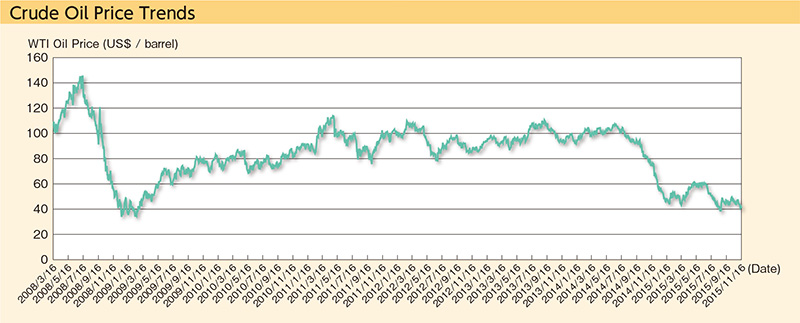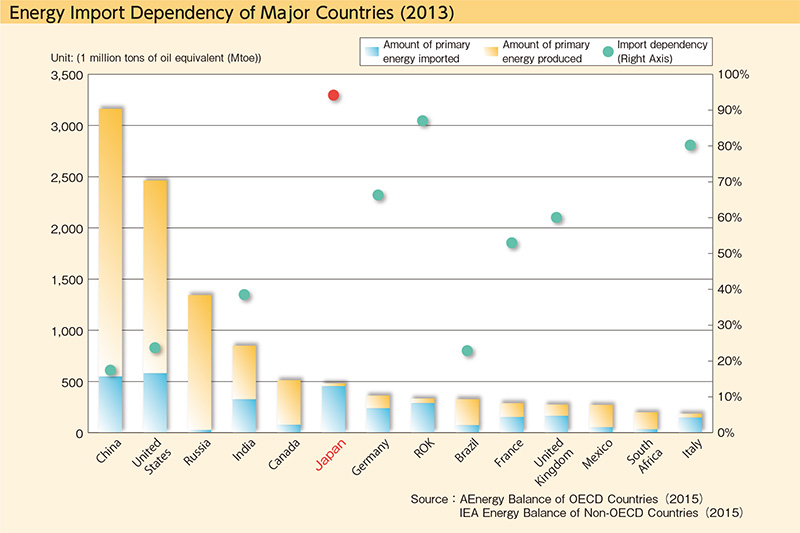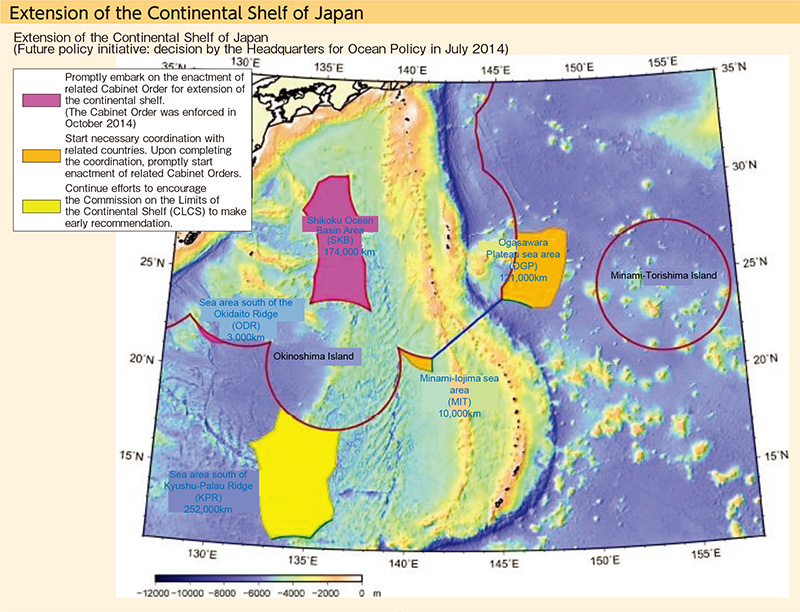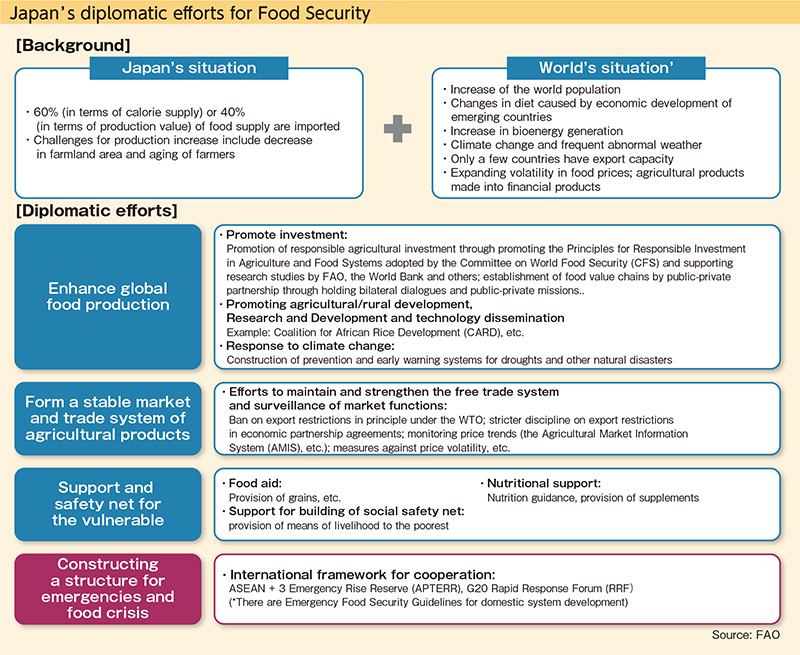Diplomatic Bluebook 2016
Chapter 3
Japan’s Foreign Policy to Promote National and Worldwide Interests
2.Building an Attractive Country Where People can Enjoy Peace of Mind in Life
(1) Securing a Stable Supply of Energy and Mineral Resources at Reasonable Prices
A. Current Situation of Energy and Mineral Resources at Home and Abroad
(a) Situation in the World
Crude oil prices had remained at high levels in recent years, reflecting factors such as increased energy demand in emerging and other countries, intensifying competition for natural resources, the rise of resource nationalism, and changing situations in the Middle East. The price, however, declined from the latter half of 2014 because of various factors such as a slowdown in oil demand due to economic stagnation in China, and the relaxation of supply and demand caused by steady increase in oil production by non-OPEC member states, including shale oil production by the U.S. The price dropped below the level of 50 US dollars per barrel in January 2015. After that, prices temporally increased due to supply disruption from Libya. Meanwhile, steady high-level oil production by both OPEC and non-OPEC member states such as the U.S. and Russia led to a global oversupply of crude oil. In December 2015, crude oil prices dropped down to the level of 30 US dollars per barrel, which is the lowest price level in about seven years. While the decline in oil prices brings benefits to energy consuming countries in the short term, it affects the financial conditions and new investments in oil producing countries. It is important to continue to keep a close observation over its medium- and long-term impact on energy security.
(b) Situation in Japan
The share of fossil fuels in Japan’s power generation reached about 90% after the Great East Japan Earthquake, while it had been about 60% before. The “Strategic Energy Plan” was approved by the Cabinet in April 2014 with increasingly serious consideration to secure a stable supply of energy at reasonable prices in a situation where the fuel procurement cost deteriorates the trade balance due to the depreciation of the yen. Moreover in July 2015, the “Long-term Energy Supply and Demand Outlook” based on the Strategic Energy Plan was adopted, which presents an ideal structure of energy supply and demand that can be realized if appropriate measures are taken based on the fundamental direction of energy policies by envisioning policy objectives to be achieved on safety, energy security, economic efficiency and the environmental protection, which are the basic ideas of the policies.


B. Diplomatic Efforts to Secure a Stable Supply of Energy and Mineral Resources at Reasonable Prices
Securing a stable supply of energy and mineral resources at reasonable prices forms the foundation for the vital economy of Japan and the livelihoods of its people. Japan has been strengthening diplomatic efforts, focusing on following activities:
(a) Strengthening Comprehensive and Mutually-Beneficial Ties with Resource-Rich Countries
In order to secure a stable supply of energy and mineral resources, Japan has been making efforts to strengthen comprehensive and mutually-beneficial ties with resource-rich countries by working on at the summit and the ministerial levels and thorough cooperation utilizing its ODA, including technical cooperation and human resources development in the resource sector. In particular, since the inauguration of the Abe Administration, Prime Minister Abe, Foreign Minister Kishida, and Economy, Trade and Industry Minister Hayashi visited major resource-rich countries in North America, the Middle East and Africa, Latin America and the Caribbean, and Asia and the Pacific, and engaged in proactive resource energy diplomacy. In 2015, for example, Prime Minister Abe visited Ukraine, the Central Asian countries (including Turkmenistan, Kazakhstan) and Mongolia and worked on these countries to seek cooperation in the resource sector.
(b) Ensuring Security of Transportation Routes
There have been threats posed by piracy along the sea lane stretching from the Middle East to Japan, through which approximately 80% of the total oil imports to Japan passes, and along other internationally important sea lanes such as those off the coast of Somalia and the Gulf of Aden. With this in mind, Japan has supported the coastal countries through such measures as enhancing capacities to police piracy, cooperating on information sharing among countries concerned, and developing navigation facilities. Japan has also been dispatching units of the Japan Self-Defense Forces and the Japanese Coast Guard officers to the areas off the coast of Somalia and the Gulf of Aden to be engaged in escort operations for any country’s commercial ships (see 3-1-3(4)).
(c) Gathering and Analysis of Resource-Related Information at the Diplomatic Missions Overseas
With a view to strengthening the function of the diplomatic missions overseas, “Special Assistants for Natural Resources” have been assigned to 55 diplomatic missions overseas in 50 countries to work intensively for the acquisition and stable supply of energy and mineral resources. Furthermore, MOFA holds a “Strategy Meeting on Natural Resources” by gathering officials who are assigned to the diplomatic missions overseas in countries which are important in terms of ensuring a stable supply of energy and mineral resources. The meetings involve active discussions concerning current situations and the future direction of Japan’s efforts for securing resources.
(d) Utilization of International Fora and Rules for Market Stabilization, Emergency Response and Others
Japan has actively participated in various International Energy Agency (IEA) activities for international collaboration and cooperation to maintain a stable supply of energy. Japan endeavors to strengthen its capability to respond to emergencies such as disruptions in oil supply, while working for a quick and accurate grasp of such information as the trends in the global energy markets, the medium- and long-term outlooks for supply and demand, and the trends in resource-producing countries. With regard to LNG prices, Japan held the “LNG Producer-Consumer Conference 2015” (hosted by METI and the Asia Pacific Energy Research Centre (APERC)) in September 2015 following on the last year’s Conference. The conference is an international meeting gathering public and private sectors from countries producing and consuming LNG. At the conference, participants shared awareness about the latest trends concerning both producers and consumers in LNG markets, and held discussions toward the development of LNG markets premised on ensuring stability, competition, and flexibility. In addition, Japan has been supporting the “Extractive Industries Transparency Initiative (EITI),” on the appropriate development and use of finite energy and mineral resources. Furthermore, Japan is advancing international cooperation in implementing the Energy Charter Treaty (ECT), which provides for the promotion of free trade and transit of energy materials and products as well as the promotion and protection of investments. In December, the 27th Meeting of the Energy Charter Conference was held in Georgia and Japan was approved to become the host country for the conference in 2016.
C. Oceans and Seas (continental shelves and deep seabed)
As Japan is not abundant in energy and mineral resources on its land, marine living resources and natural resources in the continental shelf and the sea-bed and ocean floor and subsoil thereof beyond the limits of national jurisdiction (the Area) in the surrounding waters are important, from the perspective of securing stable supply sources and ensuring the sound development of the economy. Japan is proceeding with necessary measures to secure its interests at sea based on the United Nations Convention on the Law of the Sea (UNCLOS).
Toward the establishment of its outer limits of the continental shelf beyond 200 nautical miles, Japan received the recommendations from the Commission on the Limits of the Continental Shelf (CLCS) in April 2012 in which four out of seven regions that Japan made its submission to the CLCS, were recognized and following this, in October 2014, Japan established extended continental shelves in two regions in accordance with the “Future Policy for Extending the Continental Shelf” decided by the Headquarters for Ocean Policy in July of the same year. Japan is also coordinating with a state concerned regarding another two regions and is making continuous efforts for early recommendations of the remaining one region, on which recommendations were deferred (see 3-1-6).

With regard to the Area, two Japanese contractors conducted contracts with the International Seabed Authority (ISA) and gained the exclusive rights to explore for deep-sea mineral resources in a certain exploration area and are exploring manganese nodules8 and cobalt-rich ferromanganese crusts9.
- 8 Spherical or elliptic nodules about 2-15 cm in diameter, which are half-buried on relatively flat ocean floors at depths between 4,000 - 6,000 m.
Containing useful metals such as nickel, copper, and cobalt as well as manganese. - 9 A layer deposited on the flanks or summits of seamounts at depths between 800-2,400 m with a thickness of several to several tens of centimeters, similar to asphalt.
The percentage of cobalt is higher than that of manganese nodules.
D. Efforts toward Green Growth and a Low Carbon Society
Through the use of renewable energy (solar, wind, biomass, geothermal, hydraulic, the use of oceans, etc.) and promotion of energy-efficiency, Japan has been making contributions toward the realization of green growth and the promotion of a low-carbon society in the international community, including in developing countries (through human resources development and providing know-how and expertise through international frameworks, for example).
With a view to disseminating and promoting the sustainable use of renewable energy, Japan has actively been engaged in the International Renewable Energy Agency (IRENA) and served as President of the Assembly in January 2015. Japan invited parties related to IRENA and held an international seminar on Energy Security in the Pacific Island Countries in June, as a part of its support.
(2) Ensuring Food Security
According to the latest UN report, the world population is estimated to increase to approximately 9.7 billion people by 2050. The Food and Agriculture Organization of the UN (FAO) estimates that by 2050, global food production should be about 60 percent higher than in 2005/2007. Since Japan imports most of its food from abroad, ensuring global food security contributes to securing of stable food supply for Japan as well. While increasing domestic food production, it is necessary to promote global food production and establish stable markets of agricultural products and trade systems.
According to the “State of Food Insecurity in the World 2015” (SOFI2015) issued by FAO, the International Fund for Agricultural Development (IFAD) and the World Food Programme (WFP), about 795 million people are undernourished around the world. However, the number of undernourished people has decreased by more than 100 million in the past 10 years, particularly by more than 200 million people since the 1990–1992 period. A target under the Millennium Development Goals (MDGs) to “Halve the proportion of people who suffer from hunger between 1990 and 2015” has almost been achieved in developing regions. International grain prices, however, remain at a high level amid the situation where the prices may fluctuate subject to the weather and other factors. The international community, including Japan, has a responsibility to contribute to achieving the goal on food security (Goal 2) in the 2030 Agenda for Sustainable Development, which is to alleviate this appalling situation of people in developing countries suffering from food insecurity and to end hunger.

A. Efforts in the International Frameworks Concerning Food Security
At the G7 Elmau Summit held in Germany in June 2015, Japan actively contributed to formulating an aim to lift 500 million people in developing countries out of hunger and malnutrition by 2030 and the “Broad Food Security and Nutrition Development Approach.” Based on the “New Alliance for Food Security and Nutrition” (New Alliance) announced at the G8 Camp David Summit held in the U.S. in 2012, Japan has been working on the agenda as a joint leading country together with the U.S.10to support Mozambique. In the 5th Tokyo International Conference on African Development (TICAD V) held in Yokohama in 2013, Japan expressed commitments including the continuing implementation of the Coalition for African Rice Development (CARD), expansion of the countries eligible for the Smallholder Horticulture Empowerment and Promotion Unit Project (SHEP) Approach, support to develop food value chains and the promotion of responsible agricultural investment.
Furthermore, at the G20 Antalya Summit in November 2015 held in Turkey, Japan contributed to the endorsement of the “G20 Action Plan on Food Security and Sustainable Food Systems,” aiming at promoting responsible investment in food systems, increasing incomes and quality jobs, and fostering sustainable productivity growth to increase food supply.
In May and October, the Policy Partnership on Food Security (PPFS) was held in the Philippines, and members discussed international efforts toward lasting food security in the APEC region based on the APEC Food Security Roadmap Towards 2020.
In addition, at the ASEAN+3 Summit Meeting in November, Prime Minister Abe mentioned that Japan provided rice assistance to the Philippines and Cambodia based on the ASEAN+3 Emergency Rice Reserve (APTERR Agreement,), which entered into force in 2012, and that Japan intended to further expand public-private partnerships to establish food value chains, which are promoted by Japan. He also asked for relaxing and lifting of the import restrictions that some countries have placed on Japanese food products regarding the nuclear accident.
- 10 Countries leading the development and execution of the cooperative framework together with recipient countries in order to accelerate the cooperation framework by country covered by the New Alliance.
B. Japan’s Efforts to Promote “Responsible Agricultural Investment”
While promoting international agricultural investments aimed at increasing global food production, large-scale “land grabbing” in developing countries has been a concern. Thus Japan advocated the concept of “Responsible Agricultural Investment” at the G8 L’aquila Summit held in Italy in 2009, so that investments should be promoted in a manner to create a triple win situation for recipient countries, local communities including small-holders, and investors. In April 2010, four international organizations (FAO, IFAD, the United Nations Conference on Trade and Development (UNCTAD), and the World Bank (WB)) adopted the “Principles for Responsible Agricultural Investment (PRAI). Taking the PRAI into account, the “Principles for Responsible Investment in Agriculture and Food Systems” was adopted at the general assembly of the Committee on World Food Security (CFS) in October 2014. In order to reflect case studies in discussions as well as to utilize them in application of the principles in the future, Japan has been contributing proactively to global efforts through such measures as providing a financial assistance to the “Forward-looking Research and Analysis Programme for Responsible Agricultural Investment,” which has been operated by the four international organizations since 2013.
C. Fisheries (Including Tuna Fishing and Whaling Issues)
Japan is one of the major fishing and consuming countries of marine production in the world and plays an active role in proper conservation and management of living marine resources and their sustainable use. “Convention on the Conservation and Management of High Seas Fisheries Resources in the North Pacific Ocean” entered into force in July, and the first meeting of the North Pacific Fisheries Commission (NPFC), which was established based on the Convention, was held in September. In addition, the Secretariat of the North Pacific Fisheries Commission (NPFC) was established in Tokyo.
With regard to tuna, Japan, as the largest tuna-consuming country, has joined all regional fishery management organizations (RFMOs) for tuna, and leads discussions to strengthen measures for conservation and management of resources. Japan promoted efforts against illegal, unreported and unregulated (IUU) fishing operations, such as the Resolution for a Commission for the Conservation of Southern Bluefin Tuna (CCSBT) Scheme for Minimum Standards for Inspection in Port and establishment of the Electronic Bluefin Tuna Catch Document (eBCD) System for the International Convention for the Conservation of Atlantic Tunas (ICCAT). As regards Pacific bluefin tuna, the Commission for the Conservation and Management of Highly Migratory Fish Stocks in the Western and Central Pacific Ocean (WCPFC) decided, by the initiative of Japan, to develop in 2016 an emergency rule which will be taken when drastic drops of recruitment are detected.
With regard to the Japanese eel (Anguilla japonica), which is designated as an endangered species by the International Union for Conservation of Nature and Natural Resources (IUCN), Japan had discussion with China, the ROK and Taiwan, which produce and export the Japanese eel, about the establishment of a framework on conservation and management of eel species and restrictions on eel farming volumes.
Japan’s basic whaling policy is to pursue the resumption of commercial whaling, by conducting whale research programs, based upon international law and scientific evidence in order to gather scientific data that is essential for the management of whale resources. Under this policy, with regard to whale research in the Antarctic Ocean, Japan developed the “New Scientific Whale Research Program in the Antarctic Ocean (NEWREP-A)” taking account of the Judgment of the International Court of Justice (ICJ) in March 2014 and submitted the proposed plan to the Scientific Committee of the International Whaling Commission (IWC) in November 2014. The proposed plan was reviewed at the Scientific Committee in May-June 2015. As a result of the discussions, the Scientific Committee pointed out that it would be necessary for Japan to undertake additional work. As a result of additional work by Japanese scientists, the Government of Japan assessed that all of the items pointed out by the Scientific Committee that needed to be conducted prior to the start of NEWREP-A had been completed. Therefore, Japan finalized the plan and decided to implement NEWREP-A (the special permit issued on December 7). All of the results of additional work and analyses will be reported to the IWC Scientific Committee in June 2016.
(3) Globalization of the Japanese Market and Human Resources (Inward Direct Investments)
In the Strategy of Global Outreach addressed in the “Japan Revitalization Strategy (revised in 2015),” which was approved at a Cabinet Meeting in June 2015, Japan set a target to double foreign companies’ direct investment in Japan to 35 trillion yen by 2020 (23. 3 trillion yen as of the end of 2014) as a Key Performance Indicator (KPI). With the “Council for Promotion of Foreign Direct Investment in Japan,” which has been held since 2014, acting as a control tower to promote activities for discovering and attracting investments, while gathering opinions directly from foreign company managers in collaboration with organizations such as the Council on Economic and Fiscal Policy, the Council for Industrial Competitiveness, and the Council for Regulatory Reform, Japan continuously makes further progress in taking additional measures such as institutional reforms contributing to the improvement of the investment environment in Japan, responding to the needs of foreign companies, and supporting measures to expand investment effectively.
In March, the Council for Promotion of Foreign Direct Investment in Japan adopted “Five Promises for Attracting Foreign Businesses to Japan” to improve convenience in matters in business and life in Japan in response to requests from foreign companies. These five promises are (1) promotion of multilingualization at retail stores, restaurants, hospitals public transportation facilities, etc., (2) promotion of the development of free public wireless LAN around cities and simplification of procedures to use it, (3) creation of an environment in which all regional airports receive business jets with short advance notice, (4) support of international students in finding jobs at Japanese companies, and (5) implementation of an “Investment Advisor Assignment System” with State Ministers, etc., acting as advisors for businesses having made important investments in Japan from overseas. At present, relevant ministries are steadily implementing the measures they are in charge of.
In implementing the measures listed in the “Five Promises for Attracting Foreign Businesses to Japan,” MOFA, in collaboration with the Japan External Trade Organization (JETRO) and local governments, makes use of international conferences and diplomatic missions overseas, including embassies and consulates-general, in order to appeal to foreign companies’ executives and conduct publicizing and dissemination (active PR activities on the websites of its diplomatic missions overseas, etc.), through which such activities as locating potential investors to Japan are strengthened. With regard to the promotion of individual cases, Japan is strengthening the one-stop support functions of JETRO in collaboration with the relevant ministries and agencies and creating opportunities for investment or alliance between Japanese small- and medium-sized enterprises (SMEs) and foreign companies. Furthermore, Japan has strategically conducted “top-level sales” by the Prime Minster and other ministers in collaboration with relevant organizations and forward-looking local governments, as shown by the “Investment Japan Seminar” by JETRO during Prime Minister Abe’s visit to the U.S. in September.
